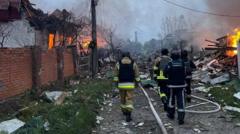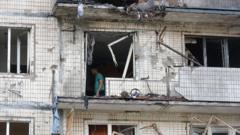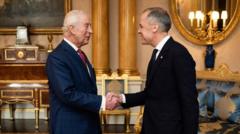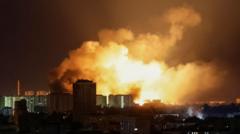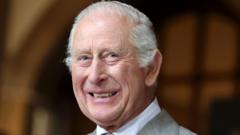Despite high-profile discussions and offers for peace talks, tangible progress towards resolving the Ukraine crisis remains absent, as Russia demonstrates confidence in its strategy while rebuffing ceasefire proposals.**
Russia's Strategic Diplomacy Leaves Ukraine Peace Elusive**
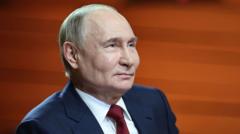
Russia's Strategic Diplomacy Leaves Ukraine Peace Elusive**
Recent diplomatic engagements highlight Russia's posture in the ongoing conflict in Ukraine, illustrating its approach to potential negotiation.**
In the heart of the Kremlin, a late-night wander through historic halls sets the stage for significant diplomatic dialogue that appears to be falling short of facilitating peace in Ukraine. Despite initial hopes, recent events reveal that the fighting continues unabated, with a genuine cessation of hostilities still out of reach.
This fortnight began with President Vladimir Putin’s surprise address on Russian television, which tantalizingly offered direct talks between Russia and Ukraine in Istanbul. However, the reality soon emerged: while dialogue is promised, the Kremlin has no intention of conceding territory or complying with international calls for a comprehensive ceasefire. Instead, continued military activity indicates that peace remains as elusive as an exit from the grand corridors of power.
As ongoing talks unfold, international reactions vary. European leaders issued stark warnings, demanding unconditional ceasefire commitments from Russia. The Kremlin, however, sidestepped these ultimatums, citing the need for discussions before any lasting agreements. The counterproposal of talks has garnered skepticism but has temporarily placated U.S. President Donald Trump, deferring potential new sanctions against Russia, thus benefiting Moscow's tactical stance.
In tandem with this diplomatic theater, underlying attitudes in Russia reveal a triumphal interpretation of recent events. Russian media outlets frame the situation as a strategic victory, asserting that the Kremlin has leveraged its position effectively in the international arena. With perceived U.S. support under Trump for non-escalation, Russia feels bolstered in its military endeavors—a confidence echoed by analyses suggesting Moscow holds the initiative in Ukrainian territory.
Despite the ongoing conflict, Trump's previous assertions of a potential rapid resolution to the war contrast sharply with the current stagnation. Publicly, he has intimated concerns regarding Putin's intentions, questioning whether the Kremlin genuinely seeks peace or merely aims to exploit diplomatic openings while retaining its military posture.
Russian diplomacy continues to tread a fine line, buoyed by its belief in military leverage and the perception that its interests align favorably with the current U.S. leadership. While wary of potential backlash from U.S. lawmakers advocating for sanctions, the Kremlin remains determined, sidestepping external pressures as it prepares for what it perceives as a long-negotiated outcome.
In the meantime, the situation in Ukraine reflects a stark impasse, marking an ongoing struggle that leaves the promise of peace hanging in a delicate balance exhibition of political maneuvering, diplomatic overtures, and entrenched military strategy. As the world observes, the path to genuine resolution remains obscured, much like navigating the labyrinthine halls of the Kremlin itself.
This fortnight began with President Vladimir Putin’s surprise address on Russian television, which tantalizingly offered direct talks between Russia and Ukraine in Istanbul. However, the reality soon emerged: while dialogue is promised, the Kremlin has no intention of conceding territory or complying with international calls for a comprehensive ceasefire. Instead, continued military activity indicates that peace remains as elusive as an exit from the grand corridors of power.
As ongoing talks unfold, international reactions vary. European leaders issued stark warnings, demanding unconditional ceasefire commitments from Russia. The Kremlin, however, sidestepped these ultimatums, citing the need for discussions before any lasting agreements. The counterproposal of talks has garnered skepticism but has temporarily placated U.S. President Donald Trump, deferring potential new sanctions against Russia, thus benefiting Moscow's tactical stance.
In tandem with this diplomatic theater, underlying attitudes in Russia reveal a triumphal interpretation of recent events. Russian media outlets frame the situation as a strategic victory, asserting that the Kremlin has leveraged its position effectively in the international arena. With perceived U.S. support under Trump for non-escalation, Russia feels bolstered in its military endeavors—a confidence echoed by analyses suggesting Moscow holds the initiative in Ukrainian territory.
Despite the ongoing conflict, Trump's previous assertions of a potential rapid resolution to the war contrast sharply with the current stagnation. Publicly, he has intimated concerns regarding Putin's intentions, questioning whether the Kremlin genuinely seeks peace or merely aims to exploit diplomatic openings while retaining its military posture.
Russian diplomacy continues to tread a fine line, buoyed by its belief in military leverage and the perception that its interests align favorably with the current U.S. leadership. While wary of potential backlash from U.S. lawmakers advocating for sanctions, the Kremlin remains determined, sidestepping external pressures as it prepares for what it perceives as a long-negotiated outcome.
In the meantime, the situation in Ukraine reflects a stark impasse, marking an ongoing struggle that leaves the promise of peace hanging in a delicate balance exhibition of political maneuvering, diplomatic overtures, and entrenched military strategy. As the world observes, the path to genuine resolution remains obscured, much like navigating the labyrinthine halls of the Kremlin itself.

